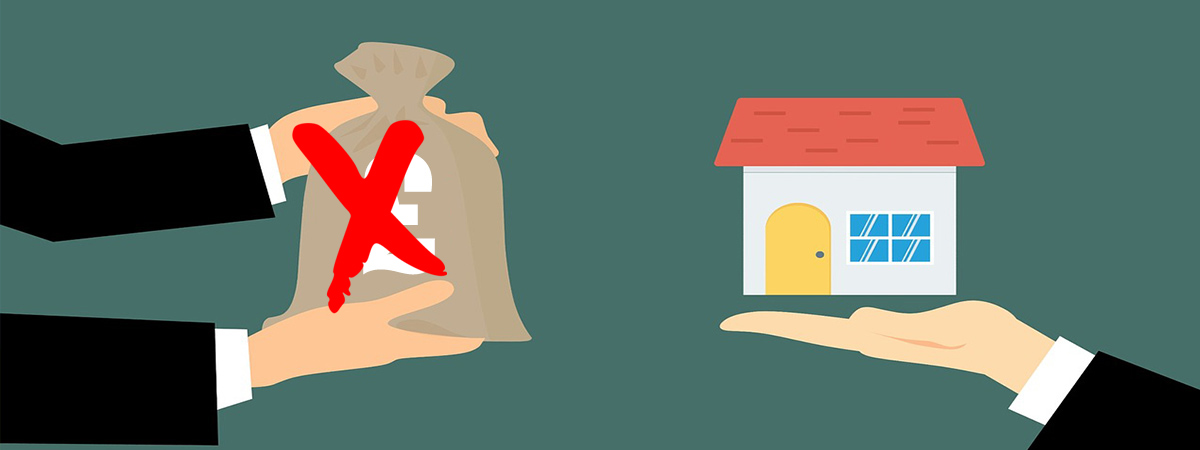
If you’re looking into the prospect of buying a property without throwing down a deposit, my assumption is that you’re already astute enough to know 1) it’s not the most sensible approach to buying a house 2) it’s a high-risk manoeuvre!
However, if that’s news to you, my concerned gut tells me you’re in over your head.
In any case, 100% mortgages are a real thing (for one reason or another), and while they’re relatively limited in availability, they can provide a life-line to those that want to hop onto the housing ladder without any savings (i.e. a deposit).
Table of contents
- You’ll need a 100% mortgage to buy a property without a deposit
- Can I get a 100% mortgage?
- Pros and cons of buying a property without a deposit
- Where can I get a 100% mortgage?
- Can I get a 100% Buy-To-Let mortgage?
- Consider a 95% mortgage (the benefits of putting down a deposit, even a tiny one)!
You’ll need a 100% mortgage to buy a property without a deposit
Getting a 100% mortgage is the only method available of buying a property without a deposit. I certainly can’t think of any other method, assuming you don’t have the money to buy outright.
A 100% mortgage is a loan which equals the entire value of a property [you wish to buy], which means no deposit is required.` For example, if the property is on the market for £100,000, a 100% mortgage loan would also be £100,000. Normally, lenders require borrowers to pay a deposit of, say 30%, and then lend you 70% of the full cost of a house.
Needless to say, that’s all pretty self-explanatory. So let’s move along swiftly to the meat and potatoes of the topic…
Can I get a 100% mortgage?
For sure, this is the tricky part – because getting a 100% mortgage is a non-starter for most people!
I don’t want to bore you with a “once upon a time story”, but of course, I shall.
Once a upon a time – before the 2008 property crash – 100% mortgages were widely available and they were certainly selling like hot cakes. In fact, I even remember seeing awkward looking 110% mortgages on the shelves (less said about them the better). Ironically, those obscure loans were the cause of the economic meltdown; lenders’ approving ludicrous loans to individuals that couldn’t realistically afford the repayments. Apparently it seemed like a good idea at the time. *blank stare*
I say ironically, because here we are, looking into 100% mortgages in order to buy a property without a deposit.
Fortunately, lessons were learned.
While 100% mortgages are still available, there aren’t many of them around, and for those that are, the criteria to qualify for the loans are significantly tighter than they used to be back in the day.
The few lenders that do offer 100% mortgages will mostly likely require you to have a guarantor, which means you will need to find, typically a close family member, to agree to take liability for your debt if you default on your repayments.
Guarantor mortgages
Personally, and at the time of writing this blog post, I haven’t seen any 100% mortgages that aren’t “guarantor mortgages”
A guarantor mortgage is a loan where most often a parent (or whichever family member you can rope into obliging) agrees to using their home or savings as security against the loan, and to cover the any mortgage repayments missed by the borrower.
Guarantor mortgages are essentially secured loans, in the sense that the loan is secured against another asset. They’re perfectly designed for people that can only afford a small deposit, or no deposit at all.
So the two takeaways should be:
- You will most likely need a guarantor to qualify for a 100% mortgage. Most lenders will require the guarantor to be a family member;
- The guarantor will need to pass certain criteria, such as, they will need to have savings or a property, and good credit history.
Pros and cons of buying a property without a deposit
Pros
- Obviously. You get to jump onto the property ladder without a deposit! Yay!
I know, that’s a lousy list of pros.
Honestly, that’s all I can think of. Just one.
But to be fair, it’s a GIGANTIC pro.
I’m genuinely trying to be positive here.
Cons
- Negative equity is a huge risk, and can cause multiple problems.
Negative equity occurs when house prices drop and the loan amount becomes greater than the value of the actual property. For example, suppose you purchase a property for £100,00 and therefore the mortgage is £100,000; if house prices drop by 5% the following day (unlikely, but very possible), your mortgage debt will still be £100,000, but the home will be worth £95,000.
One of the biggest problems with negative equity is faced when trying to remortgage (to find a better rate after the initial introductory rate expires), because lenders are very unlikely to remortgage on a property with negative equity. So you’ll then be stuck with your current lender’s Standard Variable Rate, which are typically VERY high. The end result? Higher monthly mortgage payments.
- Interest rates are typically higher with 100% mortgages. Generally speaking, bigger deposits provide access to not only more mortgage products, but also products with lower interest rates.
- You will most likely require a guarantor, and that means you will also put a family member at risk (and that can often result in family feuds, especially if you miss your payments).
Scared? Reluctant? Unsure?
Good, that means you might actually appreciate the risks of 100% mortgages.
Where can I get a 100% mortgage?
Mortgage products frequently change; products are constantly being yanked off the shelves and replaced. So if I point you towards a specific 100% mortgage product today, it may vanish by tomorrow.
So that’s why I think it’s most sensible for me to point you in the direction of Habito’s free online mortgage brokerage service – they search the whole mortgage market, which includes 90+ lenders and 20,000+ mortgages. They have access to a huge catalogue of mortgages, suitable for all types of borrowers. They also provide free exert advice.
Can I get a 100% Buy-To-Let mortgage?
Since this is, first and foremost, a landlord blog, I should address this burning question.
But first, let me say that the thought alone, of purchasing a BTL property on a 100% is total insanity!
During the 2008 property crash, a huge portion of those that got wiped out were landlords with 100% BTL mortgages.
I’m 99.99999% certain 100% BTL mortgages don’t exist anymore. At least, I haven’t seen neither hide nor hair of them. You’ll need to gather together at least a 15% deposit for a BTL mortgage. It’s even possible that won’t be enough.
100% Buy-To-Let mortgages are a non-starter as far as I’m concerned, and you shouldn’t even be looking into such foolishness *slaps your hand* Shoo! Get out of here if that’s your objective!
On a sidenote, if you’re interested, here’s my complete guide on BTL mortgages. And nope, you’ll see no mention of 100% mortgages in there. That’s for sure.
Consider a 95% mortgage (the benefits of putting down a deposit, even a tiny one)!
The reality is, anyone that is seriously contemplating 100% mortgages is in dire straights, or in some form of desperation. I can appreciate that.
However, I would personally try to avoid opting for a 100% mortgage if at all possible. A small deposit is better than no deposit. Even throwing down a tiny 5% deposit will minimise your risk, and it will significantly increase the choices you have available in terms of mortgage products.
If raising a 5% deposit will require standing on the sidelines for a further 6 months, and having to tolerate unbearable parents’, I believe it’s a price worth paying. I say that knowing the risks of 100% mortgages and the trail of destruction they can leave behind if shit hits the fan.
95% deposits will open up many more doors. Of course, if you think you can grit your teeth and muster together even more, then that’s even sweeter.
Once again, if you’re looking for advice, particularly in regards to what mortgage products are available to you, I recommend using Habito’s free mortgage brokerage service.
Disclaimer: I'm just a landlord blogger; I'm 100% not qualified to give legal or financial advice. I'm a doofus. Any information I share is my unqualified opinion, and should never be construed as professional legal or financial advice. You should definitely get advice from a qualified professional for any legal or financial matters. For more information, please read my full disclaimer.


 Landlord Products / Services
Landlord Products / Services




























Hi,
He is pretty well known in the property investment community, suffice to say I have not heard to many positive things of his services but then again I haven't used his services myself.
Buying Below Market Value with no deposit isn't new and has been a common way to buy multiple properties without cash. Personally I don't see the need to buy when you can control a property with the existing loan (another far more efficient and true win win strategy for everyone involved).
By the way love the blog posts. Its good to see someone who says how it should is.